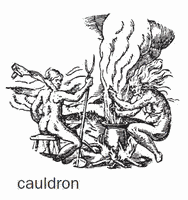cauldron
(redirected from caldrons)Also found in: Thesaurus, Encyclopedia.
caul·dron
also cal·dron (kôl′drən)n.
1. A large vessel, such as a kettle or vat, used for boiling.
2. A state or situation of great distress or unrest felt to resemble a boiling kettle or vat: a cauldron of conflicting corporate politics.
[Middle English caudron, caldroun, from Anglo-Norman cauderon, caldroun, diminutive of caudere, caldere, cooking pot, from Late Latin caldāria, pot for boiling, from feminine of Latin caldārius, suitable for warming, from calidus, warm; see kelə- in Indo-European roots.]
American Heritage® Dictionary of the English Language, Fifth Edition. Copyright © 2016 by Houghton Mifflin Harcourt Publishing Company. Published by Houghton Mifflin Harcourt Publishing Company. All rights reserved.
cauldron
(ˈkɔːldrən) orcaldron
n
(Cookery) a large pot used for boiling, esp one with handles
[C13: from earlier cauderon, from Anglo-French, from Latin caldārium hot bath, from calidus warm]
Collins English Dictionary – Complete and Unabridged, 12th Edition 2014 © HarperCollins Publishers 1991, 1994, 1998, 2000, 2003, 2006, 2007, 2009, 2011, 2014
caul•dron
or cal•dron
(ˈkɔl drən)n.
a large kettle or boiler.
[1250–1300; Middle English cauderon < Anglo-French < Late Latin caldāria, n. use of feminine of Latin caldārius of warming, derivative of calidus warm, calēre to be warm]
Random House Kernerman Webster's College Dictionary, © 2010 K Dictionaries Ltd. Copyright 2005, 1997, 1991 by Random House, Inc. All rights reserved.
cauldron
Associated with medieval witches, this is a large iron pot in which poisons, ointments and philtres were brewed.
Dictionary of Unfamiliar Words by Diagram Group Copyright © 2008 by Diagram Visual Information Limited
ThesaurusAntonymsRelated WordsSynonymsLegend:
Switch to new thesaurus
| Noun | 1. |  cauldron - a very large pot that is used for boiling cauldron - a very large pot that is used for boilingpot - metal or earthenware cooking vessel that is usually round and deep; often has a handle and lid |
Based on WordNet 3.0, Farlex clipart collection. © 2003-2012 Princeton University, Farlex Inc.
Translations
مِرْجَلٌ، قِدْرٌ
kotel
heksegryde
kotao
ketill
katilas
katls
cauldron
[ˈkɔːldrən] N → caldera f, calderón ma cauldron of unrest (fig) → una caldera or olla a presión
Collins Spanish Dictionary - Complete and Unabridged 8th Edition 2005 © William Collins Sons & Co. Ltd. 1971, 1988 © HarperCollins Publishers 1992, 1993, 1996, 1997, 2000, 2003, 2005
Collins English/French Electronic Resource. © HarperCollins Publishers 2005
Collins German Dictionary – Complete and Unabridged 7th Edition 2005. © William Collins Sons & Co. Ltd. 1980 © HarperCollins Publishers 1991, 1997, 1999, 2004, 2005, 2007
Collins Italian Dictionary 1st Edition © HarperCollins Publishers 1995
cauldron
(ˈkoːldrən) noun a large deep pot (used especially by witches) for boiling things in.
Kernerman English Multilingual Dictionary © 2006-2013 K Dictionaries Ltd.
